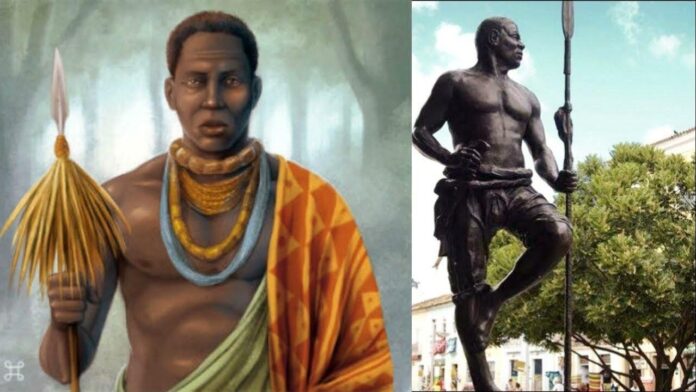The captivating tale of Ganga Zumbi, often referred to as the African Spartacus, unfolds as a remarkable saga of resilience and rebellion against the backdrop of the 17th-century Brazilian landscape.
Born in Kongo in 1630, Ganga Zumbi’s life journey commenced in enslavement, as he was forcibly transported to Brazil to toil as a plantation slave. However, against all odds, he managed to break free from the shackles of bondage, forging a path that would transform him into a symbol of resistance and freedom.
Ganga Zumbi’s name itself carries a profound cultural significance, likely derived from “Nganga Nzambi,” signifying “God’s priest” in the Kikongo language spoken in the Kongo empire. This linguistic connection adds depth to his narrative, linking his identity to spiritual connotations rooted in his African heritage.
The genesis of Ganga Zumbi’s extraordinary legacy unfolds as he not only liberated himself but rallied fellow enslaved Africans, leading to the establishment of his kingdom, Palmares. Situated in the challenging terrain between the states of Alagoas and Pernambuco in northeastern Brazil, Quilombo dos Palmares emerged as an alliance of “independent settlements” founded by runaway Brazilian African captives in the late 16th century. This collective resistance stood as a defiant response to the encroachment of European colonizers and enslavers.
Palmares, a sanctuary for approximately 10,000 to 20,000 fugitive slaves, native Brazilians, and marginalized groups such as Jews and Muslims, became a beacon of freedom in the Americas. For nearly a century, Black inhabitants of Quilombo fiercely resisted colonial oppressors, particularly the Portuguese seeking to assert dominance over Brazil.
Ganga Zumbi, as the king of Quilombo, played a pivotal role in leading these courageous attacks against the oppressors. Despite incessant threats from colonial authorities, Quilombo flourished as a fugitive community, establishing a collective economy grounded in subsistence agriculture, trade, and communal land ownership.
However, Ganga Zumbi’s quest for a lasting peace with the Portuguese marked a turning point in his legacy. In an attempt to secure recognition of Quilombo’s land and freedom for its inhabitants, he entered into a treaty with the Portuguese. The terms dictated that Palmarinos would relocate to the Cucau Valley, a decision met with disapproval from his nephew, Zumbi, the settlement’s military leader.
Zumbi’s dissent escalated into a coup against Ganga Zumbi, choosing resistance over compromise with the Portuguese. The events took a tragic turn when Ganga Zumbi was reportedly poisoned, a consequence of the internal strife within the Quilombo. Loyalties were divided, and those aligned with Ganga faced capture and re-enslavement as they attempted to re-establish Palmares in the Cucau Valley.
Despite the complexities of Ganga Zumbi’s final chapter, his enduring legacy resonates as a testament to the indomitable spirit of those who fought for freedom and resisted oppression in the face of formidable challenges. Ganga Zumbi’s story stands as a crucial chapter in the broader narrative of the African diaspora and the relentless pursuit of liberty in the Americas.

